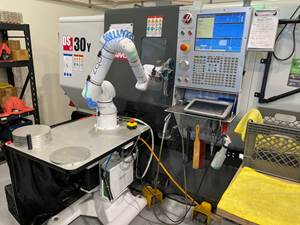Preventative Maintenance Programs Head Off Downtime Before It Starts
In today's intense marketplace, the conventional wisdom of don't fix it if it isn't broken no longer prevails as major manufacturers realize they cannot afford sudden misalignment and unplanned downtime with their major machine tools.
Share





In today's intense marketplace, the conventional wisdom of "don't fix it if it isn't broken" no longer prevails as major manufacturers realize they cannot afford sudden misalignment and unplanned downtime with their major machine tools.
Sikorsky Aircraft Corp. (Stratford, Connecticut) recognizes that regular preventive maintenance with planned downtime is a far wiser course, and the company recently signed contracts for Cincinnati Machine's (Cincinnati, Ohio) Preventive/Predictive Maintenance (PM) Program and for the Machine Certification (MC) Program for the ten Cinturn lathes operating at its primary production and assembly facility. Sikorsky, a world leader in the design and manufacture of advanced military and commercial helicopters, uses the Cinturns to machine spindles and spindle cuffs for rotors as well as numerous other parts for the S-70 Blackhawk military helicopters and the S-76 commercial helicopters.
The principal focus was machine certification, says Roger Houle, systems analyst and planning supervisor, after Sikorsky found that the Cinturns had to be brought to a level of reliability. "We had experienced a lot of downtime and weren't getting the capacity out of our equipment. That's when we contracted with Cincinnati Machine to start the Machine Certification Program," Mr. Houle continues.
The Cincinnati technicians will check and correct the machines' alignments and position by the use of lasers, ball bars, electronic levels and granite cubes. They will review all the work performed on the machine and certify that the machines meet or exceed original specifications.
As an ISO 9000 company, Sikorsky must have its machines certified, Mr. Houle says, and certification is critically important to customers because the quality of Sikorsky parts depends on the quality of its equipment.
Integration of the MC Program has taken longer than expected because numerous problems were discovered in the machines, which had not undergone intense maintenance for 5 years, he notes. When the last Cinturn is certified, Mr. Houle continues, "we're going to re-order the MC program and do a continuous recertification. We will keep these machines up to spec because we can't afford to fall behind."
Cincinnati technicians also carried out extensive maintenance on Sikorsky's three Hydrotel three-spindle vertical milling machines, which were constantly breaking down because they had not been adequately maintained, Mr. Houle says. "Cincinnati Machine's technicians did a wide range of repairs on all of them and brought them back into spec."
Sikorsky also is working with Cincinnati Machine on a PM Program for its automated manufacturing (AMS) cell, a series of six HPC-800 horizontal machining centers connected by a trolley, and an MC Program for the plant's older bridge milling machines, Mr. Houle says.
"Cincinnati will conduct a health check on the AMS cell machines in the middle of the year, evaluate anything that might be wrong with them and estimate what it might cost to fix them, whether the repairs are done by Cincinnati or by us," he explains. "Then we would do a recertification on the machines once a year."
Sikorsky also plans to certify its 35-year-old Cincinnati bridge mills, Mr. Houle says. "We're also looking into a program where Cincinnati will come in . . . and give us an evaluation of the bridge mills and determine what it would cost to bring these big machines back into certification."
The most significant benefit of the MC and PM Programs is that Sikorsky has higher quality machines and can manufacture better quality parts with less downtime. In addition, Cincinnati Machine technicians trained Sikorsky personnel on the correct ways to certify the machines and altered procedures to better pinpoint problems in the machines, which have been highly beneficial for operators and the maintenance staff, Mr. Houle says.
Training machine operators was imperative, Mr. Houle notes, because they are critical factors in the maintenance process. "The operators must recognize when a machine is developing a problem, and they have to notify us when a machine crashes. We need to know when a machine has crashed, or else we don't know what to look for and repair," he says.
"Now our personnel are trained to start checking machines, to pull pins in certain areas, such as the ballscrews, and to look for problems. We're also trained in the use of certification tooling so we can perform tooling on our own, so that if we have crashes, we can get the machines back into spec in a short period of time."
Sikorsky is convinced of the effectiveness of the PM and MC Programs, Mr. Houle says, and Cincinnati Machine has been exceptional to work with. "They've worked very well with us—they go out of their way to accommodate us and get things done."
Related Content
Automation and Process Simplification Define Eastec 2023
Manufacturing technology at this year’s Eastec met the market with tools to streamline operations and assist machinists in achieving greater productivity.
Read MoreIncrease Savings and Streamline Purchasing Operations with Amazon Business
Machine shops and small manufacturers are finding cost and time savings using Amazon Business in their shops.
Read MoreBecoming a More Efficient Shop With the Right Processes and Software
After refining its machining processes for more efficient production, this shop still needed a better way to track its data. Here's how it found a software solution.
Read MoreERP and Process Changes Increase Shop’s Revenue 64% YoY
Implementing ProShop has led to a massive process overhaul at Marzilli Machine. From 2020 to 2021, revenue increased 64% without capital investment.
Read MoreRead Next
Machine Shop MBA
Making Chips and 91ÊÓƵÍøÕ¾ÎÛ are teaming up for a new podcast series called Machine Shop MBA—designed to help manufacturers measure their success against the industry’s best. Through the lens of the Top Shops benchmarking program, the series explores the KPIs that set high-performing shops apart, from machine utilization and first-pass yield to employee engagement and revenue per employee.
Read MoreAMRs Are Moving Into Manufacturing: 4 Considerations for Implementation
AMRs can provide a flexible, easy-to-use automation platform so long as manufacturers choose a suitable task and prepare their facilities.
Read More




















